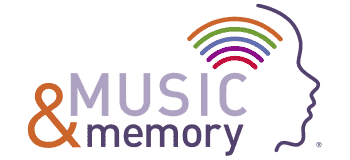Music Sharing Terms & Conditions
We are often asked about legal use of music as part of a Music & Memory program. This depends on a number of factors, including your chosen music provider as well as the setting in which you’re providing the music. As a starting point, our primary recommendation is to follow the Terms and Service agreement of your chosen provider. Policies vary, and it is important to understand the limitations of music sharing per their agreement; be aware there may be regulations restricting how music should be used and shared with others.
Purchasing Music
It is important that the organization owns the music that will be used by their Music & Memory program. It cannot be borrowed or loaned, e.g from library or loaned from a staff person. If it is donated, is should have documentation or a receipt to officiate the transfer of ownership.
When purchasing music, we recommend using a company card to prove ownership by the organization. We also recommend setting up a company-based email address to set up online profiles with music providers, e.g an Apple ID. This will also make it easier to maintain access to the account in the long term.
Offering Music
Nursing homes and other care organizations typically set up commercial licenses to provide coverage for public performances that occur within the organization on a regular basis, including playing music, either recorded or on radio and TV programs in public areas, and visits by musicians and bands. License fees are usually tiered by the number of individuals served by the organization.
Providers:
If your organization has a commercial license, it is ok to purchase music from Apple Music or other MP3 providers and use one mp3 as often as you want because the fees for public broadcast will be covered by the license. If you do not have a commercial license, our recommendation is to follow the Terms and Service agreement of your chosen provider, and be aware that there may be limitations on use of the music.
For questions, email info@musicandmemory.org.
Music Sharing Terms & Conditions
We are often asked if there are any copyright limitations when transferring music onto a large number of iPods for noncommercial use. The answer is NO, but certain terms and conditions apply.
Please refer to the following verbiage from Apple’s Terms and Conditions. Section (vi) is the key clearance for the MUSIC & MEMORY® program. “Unlimited syncing” is based on the following iTunes Terms of Service Usage Rules.
PLEASE NOTE:
- The term “device” refers to computers or iOS devices, NOT iPods.
- Restrictions on burning refers ONLY to burning CDs or DVDs.
Usage Rules
(i) You shall be authorized to use iTunes Products only for personal, noncommercial use.
(ii) You shall be authorized to use iTunes Products on five iTunes-authorized devices at any time, except for Content Rentals (see below).
(iii) You shall be able to store iTunes Products from up to five different Accounts at a time on compatible devices, provided that each iPhone may sync tone iTunes Products with only a single iTunes-authorized device at a time, and syncing an iPhone with a different iTunes-authorized device will cause tone iTunes Products stored on that iPhone to be erased.
(iv) You shall be authorized to burn an audio playlist up to seven times.
(v) You shall not be entitled to burn video iTunes Products or tone iTunes Products.
(vi) iTunes Plus Products do not contain security technology that limits your usage of such products, and Usage Rules (ii) – (v) do not apply to iTunes Plus Products. You may copy, store, and burn iTunes Plus Products as reasonably necessary for personal, noncommercial use.
(vii) You shall be able to manually sync a movie from at least one iTunes-authorized device to devices that have manual sync mode, provided that the movie is associated with an Account on the primary iTunes-authorized device, where the primary iTunes authorized device is the one that was first synced with the device or the one that you subsequently designate as primary using iTunes.
Excerpted from Apple Inc.’s Terms and Conditions, available in full on Apple’s website:
http://www.apple.com/legal/internet-services/itunes/us/terms.html
